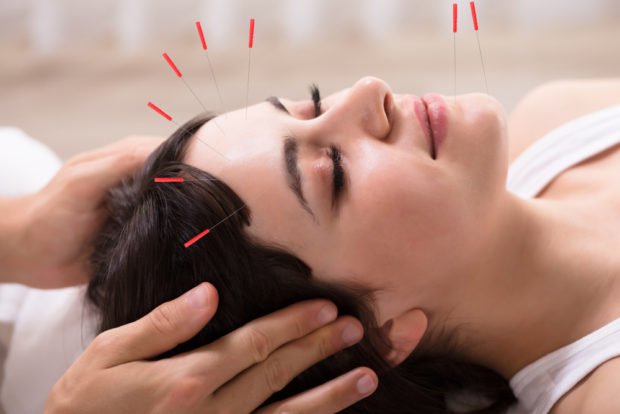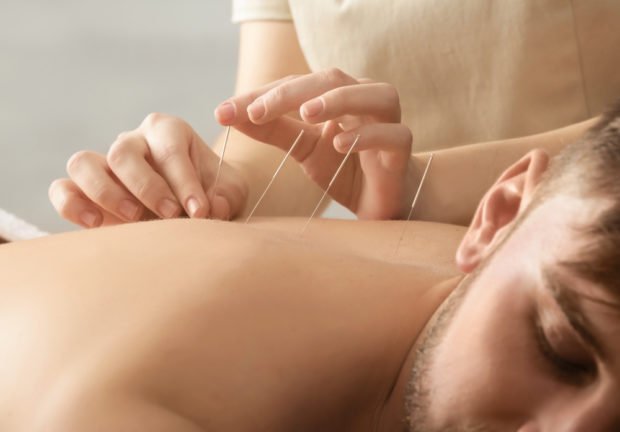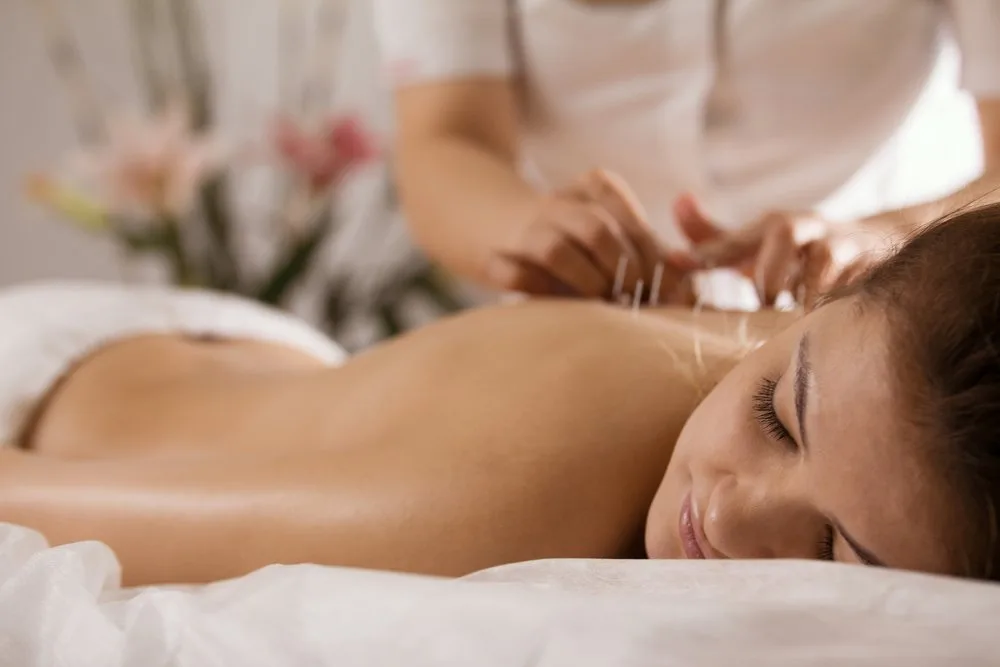The thought of inserting thin needles into various pressure points in the body may sound like a form of torture, yet it’s really a popular practice called acupuncture that continues to grow in popularity all over the world.
In fact, this aspect of Traditional Chinese Medicine (TCM), which originated over 2000 years ago, is now sought out as it’s been credited to helping treat a variety of diseases.
What exactly is acupuncture?
Acupuncture is aimed at treating ailments by triggering specific pressure points in the body. “Acupuncture is also often used for relief from allergies and motion sickness, invigorating the fatigued, nurturing fertility, and improving digestion. Beyond physical health, acupuncture can also assist with stress reduction and even cosmetic rejuvenation.“ – Hillary Talbott Roland, Co-Founder at Art of Acupuncture. TCM theorists have revealed that there exist over 2000 pressure points on the body, and each is connected by 12 meridians (1). Each meridian is linked to a different organ system, and each helps to regulate the flow of Qi throughout the body as well as their respective organs.
According to TCM, Qi (pronounced chee) is a vital energy that circulates throughout the body. If Qi is flowing properly, then one is likely to be enjoying good health. Thus, any disruption in the flow of Qi can result in illness. Therefore, the premise is that by inserting needles into specific acupuncture points, one can help to rebalance this energy and encourage the circulation of Qi which then serves to promote good health.
Now you may be skeptical about how the concept of flowing Qi and needles help to alleviate ailments, yet the World Health Organization has recognized acupuncture as being able to address certain ailments that include UTIs, high blood pressure, and even migraines.
5 Benefits of Acupuncture
1. Chronic Pain
As the opioid crisis continues to be an area of concern, a number of people are looking to alternative methods in terms of pain management, and it appears that acupuncture has become the method of choice.
In 2006, researchers from the University Medical Center in Berlin focused on patients with chronic back pain. They found that those who had experienced acupuncture treatments over the course of eight weeks reported a significant difference in pain when compared to other patients who had not received any treatment (2).
Later, in 2012, a research review published in the Archives of Internal Medicine found that acupuncture was quite effective in addressing back and neck pain, osteoarthritis, chronic headache, as well as shoulder pain.
In more recent years, a 2017 report published in the Annals of Internal Medicine found a strong link between acupuncture and decreased pain intensity as well as better function.
2. Migraines
Migraines can be both incredibly painful and debilitating. Luckily, research has suggested that acupuncture can help address migraine symptoms.

According to a review published in the Cochrane Database of Systematic Reviews, researchers found that using acupuncture to help treat migraine symptoms helped to both alleviate migraine pain and reduce the frequency of episodes. It appears that applying acupuncture to the pressure points found at the back of the head and the neck can help to mitigate these symptoms.
3. Insomnia
Getting sufficient hours of sleep every night is important. Not doing so can increase the risk of depression, heart disease, diabetes, and obesity. So, if you’re struggling to fall asleep, you should perhaps visit your local acupuncturist.
According to research published in the Evidence-Based Complementary and Alternative Medicine Volume journal, acupuncture helped to reduce insomnia symptoms and improve sleep quality better than prescription sleep drugs.
4. Cancer Recovery
The side effects that come with cancer treatments, particularly chemotherapy, can definitely take a toll on the body. These side effects range from loss of appetite and fatigue to diarrhea and nausea as well as vomiting. However, the National Cancer Institute has suggested that acupuncture can help speed up recovery following cancer treatments.
According to a study published in the Supportive Care in Cancer journal, the use of acupuncture helped to boost immunity as well as prevent a decrease in the number of healthy cells.
5. Cognitive Health
According to early research from 2002, acupuncture helped to improve symptoms in patients affected with Parkinson’s disease. The study, published in the journal Movement Disorders, found that 85% of the 20 Parkinson’s patients who had been treated with acupuncture for 16 sessions reported improvements in their tremor, walking, handwriting, slowness, pain, sleep, depression, and anxiety, all without any adverse effects.
While more human studies are still needed, animal studies have found that acupuncture can help to maintain brain health by boosting cognitive function, including learning and memory (3).
What to expect during treatment
 Once you make your appointment with your local, licensed acupuncturist, they will ask you a series of questions that cover your health concerns, diet, sleep, stress level, and other lifestyle habits. They will also inquire about your emotions, appetite, pain, and health-related goals.
Once you make your appointment with your local, licensed acupuncturist, they will ask you a series of questions that cover your health concerns, diet, sleep, stress level, and other lifestyle habits. They will also inquire about your emotions, appetite, pain, and health-related goals.
Following this questioning, the acupuncturist will examine your appearance carefully, making sure to examine your tongue as well as take your pulse at three points on each wrist, noting the strength, quality, and rhythm. This is because TCM considers the tongue and pulses to be true reflections of your organ system and meridians.
Once they begin the actual treatment, your acupuncturist will use six to 15 sterile, disposable small needles per treatment, leaving them in for about 10 to 20 minutes. Once the needles are removed, you will be advised to drink plenty of water before going about your day.
If you’re worried about the pain, you may feel a slight pinch as the acupuncture needle is being inserted, yet nothing beyond that. However, it’s important to notify your acupuncturist immediately if you begin to experience pain, numbness, or discomfort during the treatment.
Are there any side effects?
While the FDA does regulate acupuncture needles as medical devices, it asks that said needles be “sterile, nontoxic, and labeled for single use by qualified practitioners only.”, there are still risks associated with the practice. This is why it’s important to always consult a licensed and well-trained acupuncturist who operates in a hygienic and safe environment. Not doing so can be quite dangerous.
According to a report from Scientific Reports, the risks associated with acupuncture include infections, nerve and blood vessel injury, punctured organs, including skin rashes, allergic reactions, bruising, pain, bleeding, nausea, dizziness, fainting, complications from needle breakage as well as hemorrhage.
Once again, it’s paramount to ensure that your acupuncturist is well-trained.
It’s also important to note that acupuncture is more of complementary treatment, and it should never be solely used in the place of standard medical care. Rather, use it alongside conventional treatments, especially in cases of chronic or severe illnesses.
References
Brinkhaus B, Witt CM, Jena S, et al. Acupuncture in Patients With Chronic Low Back Pain: A Randomized Controlled Trial. Arch Intern Med. 2006;166(4):450–457. doi:https://doi.org/10.1001/archinte.166.4.450
Casio, D, Lin E.H, Traditional Chinese Medicine & Acupuncture, Practical Pain Management (2016), https://www.practicalpainmanagement.com/treatments/complementary/acupuncture/traditional-chinese-medicine-acupuncture
Chan, M.W.C., Wu, X.Y., Wu, J.C.Y. et al. Safety of Acupuncture: Overview of Systematic Reviews. Sci Rep 7, 3369 (2017) doi:10.1038/s41598-017-03272-0
Chou R, Deyo R, Friedly J, et al. Nonpharmacologic Therapies for Low Back Pain: A Systematic Review for an American College of Physicians Clinical Practice Guideline. Ann Intern Med. 2017;166:493–505. [Epub ahead of print 14 February 2017]. doi: https://doi.org/10.7326/M16-2459
Deng, G., Giralt, S., Chung, D.J. et al. Support Care Cancer (2018) 26: 657. https://doi.org/10.1007/s00520-017-3881-7
Jing Guo, Lin-Peng Wang, Cun-Zhi Liu, et al., “Efficacy of Acupuncture for Primary Insomnia: A Randomized Controlled Clinical Trial,” Evidence-Based Complementary and Alternative Medicine, vol. 2013, Article ID 163850, 10 pages, 2013. https://doi.org/10.1155/2013/163850.
Leung, M. C., Yip, K. K., Lam, C. T., Lam, K. S., Lau, W., Yu, W. L., … So, K. F. (2013). Acupuncture improves cognitive function: A systematic review. Neural regeneration research, 8(18), 1673–1684. doi:10.3969/j.issn.1673-5374.2013.18.005
Linde K, Allais G, Brinkhaus B, Fei Y, Mehring M, Vertosick EA, Vickers A, White AR. Acupuncture for the prevention of episodic migraine. Cochrane Database of Systematic Reviews 2016, Issue 6. Art. No.: CD001218. DOI: 10.1002/14651858.CD001218.pub3.
Shulman LM, Wen X, Weiner WJ, Bateman D, Minagar A, Duncan R, et al. Acupuncture therapy for the symptoms of Parkinson’s disease. Mov Disord. 2002;17:799–802. https://doi.org/10.1002/mds.10134
Vickers AJ, Cronin AM, Maschino AC, et al. Acupuncture for Chronic Pain: Individual Patient Data Meta-analysis. Arch Intern Med. 2012;172(19):1444–1453. doi:https://doi.org/10.1001/archinternmed.2012.3654





![women [longevity live]](https://longevitylive.com/wp-content/uploads/2020/01/photo-of-women-walking-down-the-street-1116984-100x100.jpg)









